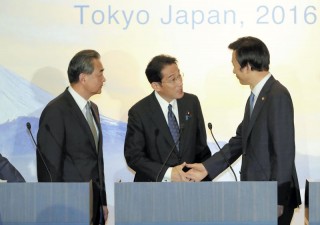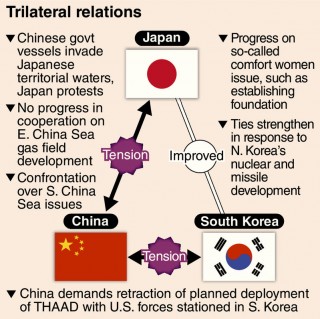Loading
Search
▼ Tense Japan-China Relationship Expected to Continue
- Category:Other
A meeting between the Japanese and Chinese foreign ministers failed to ease tensions that have soared since Chinese government ships repeatedly intruded in Japanese territorial waters near the Senkaku Islands in early August. Some observers are concerned bilateral ties could remain strained for some time yet.
Wednesday’s meeting between Foreign Minister Fumio Kishida and his Chinese counterpart, Wang Yi, was their first since the incursions. Kishida lodged a strong protest to Wang over the repeated incursions in waters around the islands in Okinawa Prefecture.
“If the situation improves in the East China Sea, I want to improve bilateral relations through dialogue, including a meeting between Prime Minister Shinzo Abe and Chinese President Xi Jinping on the sidelines of the [upcoming] Group of 20 summit meeting [in China],” Kishida said. Kishida emphasized that holding the Abe-Xi meeting hinged on China taking steps to calm the situation.
Wang said, “It’s necessary to prevent any deterioration of the East China Sea situation and to avoid any unexpected situations.” He was positive about quickly establishing a “maritime liaison mechanism” to prevent accidental collisions between ships in the region.
However, after the meeting, Wang criticized Kishida’s comment about a possible Abe-Xi meeting at the G-20 summit. “Common sense holds that the guest does as the host says,” Wang said to reporters.
The awkwardness between Kishida and Wang also was evident during their trilateral meeting with South Korean Foreign Minister Yun Byung Se earlier in the day. In a pointed comment regarding China’s reluctance at the U.N. Security Council to issue a fresh statement over North Korea’s missile launch, Kishida said, “China, as a responsible permanent member of the Security Council, should deal more robustly with this issue.”
However, during the meeting and the following press conference, Wang did not miss his chance to take a jab at Japan by repeatedly mentioning the importance of “squarely facing up to history.”
The government initially hoped to boost Japan-China ties through the three-way foreign ministerial talks and the G-20 summit meeting. However, the Chinese ship incursions into Japanese territorial waters have upset this scenario, which focuses on dialogue.
In autumn 2017, China’s Communist Party is scheduled to hold a party congress at which a major power transition will take place. Arrangements to fill the posts in the next leadership lineup are already going on behind the scenes. According to a senior Foreign Ministry official, contenders for these positions “probably won’t show any weakness toward other countries” because they could be attacked politically if they did. Consequently, some observers have suggested tension between Japan and China could continue for an extended period.
Wednesday’s meeting between Foreign Minister Fumio Kishida and his Chinese counterpart, Wang Yi, was their first since the incursions. Kishida lodged a strong protest to Wang over the repeated incursions in waters around the islands in Okinawa Prefecture.
“If the situation improves in the East China Sea, I want to improve bilateral relations through dialogue, including a meeting between Prime Minister Shinzo Abe and Chinese President Xi Jinping on the sidelines of the [upcoming] Group of 20 summit meeting [in China],” Kishida said. Kishida emphasized that holding the Abe-Xi meeting hinged on China taking steps to calm the situation.
Wang said, “It’s necessary to prevent any deterioration of the East China Sea situation and to avoid any unexpected situations.” He was positive about quickly establishing a “maritime liaison mechanism” to prevent accidental collisions between ships in the region.
However, after the meeting, Wang criticized Kishida’s comment about a possible Abe-Xi meeting at the G-20 summit. “Common sense holds that the guest does as the host says,” Wang said to reporters.
The awkwardness between Kishida and Wang also was evident during their trilateral meeting with South Korean Foreign Minister Yun Byung Se earlier in the day. In a pointed comment regarding China’s reluctance at the U.N. Security Council to issue a fresh statement over North Korea’s missile launch, Kishida said, “China, as a responsible permanent member of the Security Council, should deal more robustly with this issue.”
However, during the meeting and the following press conference, Wang did not miss his chance to take a jab at Japan by repeatedly mentioning the importance of “squarely facing up to history.”
The government initially hoped to boost Japan-China ties through the three-way foreign ministerial talks and the G-20 summit meeting. However, the Chinese ship incursions into Japanese territorial waters have upset this scenario, which focuses on dialogue.
In autumn 2017, China’s Communist Party is scheduled to hold a party congress at which a major power transition will take place. Arrangements to fill the posts in the next leadership lineup are already going on behind the scenes. According to a senior Foreign Ministry official, contenders for these positions “probably won’t show any weakness toward other countries” because they could be attacked politically if they did. Consequently, some observers have suggested tension between Japan and China could continue for an extended period.
In recent months, China has suffered several diplomatic defeats. In July, its claims over the South China Sea were completely rejected in a ruling by an arbitral tribunal. Furthermore, its cozy ties with South Korea have cooled. These developments have made ensuring the G-20 summit meeting is a success the most important issue for Beijing.
Wang’s visit to Japan “was for short-term dialogue staged to make sure a successful G-20 summit can be held,” a government source said. Many others in the government share this view.
Ties with S. Korea warming
By Kentaro Nakajima / Yomiuri Shimbun Staff Writer
Japan’s ties with South Korea are growing warmer as both nations expand their cooperation on issues including security and support for former comfort women.
The improvement in ties was underlined Wednesday when Foreign Minister Fumio Kishida met with his South Korean counterpart, Yun Byung Se, in Tokyo.
“Close cooperation between Japan and South Korea is essential, considering the security environment in Asia and issues regarding North Korea,” Kishida said at the beginning of their meeting. Yun responded by saying, “Both our countries should cooperate increasingly closely.” During their talks, both ministers agreed to seek a “future-oriented” bilateral relationship.
Tokyo-Seoul ties have improved remarkably since December, when both governments reached a deal on the so-called issue of comfort women. In 2016, North Korea has conducted a nuclear test and fired missiles several times, which has prompted Japan and South Korea to strengthen their previously stalled security cooperation within a tripartite framework including their joint ally the United States.
Amid this trend of warming ties, Prime Minister Shinzo Abe instructed the Cabinet to quickly decide on the disbursement of ¥1 billion for the Reconciliation and Healing Foundation, an organization set up by the South Korean government to support former comfort women. The Cabinet decided to disburse this money before Kishida met with Yun on Wednesday.
“South Korea had been cozying up to China, but now it’s definitely leaning more toward Japan and the United States,” a Japanese government source said. “Japan wants to keep this momentum going by fulfilling its responsibility under the deal.”
There has been no movement toward removing the statue of a girl that was placed in front of the Japanese Embassy in Seoul by a citizens group that supports former comfort women. Consequently, some members of the ruling Liberal Democratic Party and other groups were cautious about providing the ¥1 billion at this time.
Although there were fears disbursing this large sum could spark a domestic backlash depending on how the situation unfolded, the Japanese government decided to put priority on improving ties with South Korea.
Wang’s visit to Japan “was for short-term dialogue staged to make sure a successful G-20 summit can be held,” a government source said. Many others in the government share this view.
Ties with S. Korea warming
By Kentaro Nakajima / Yomiuri Shimbun Staff Writer
Japan’s ties with South Korea are growing warmer as both nations expand their cooperation on issues including security and support for former comfort women.
The improvement in ties was underlined Wednesday when Foreign Minister Fumio Kishida met with his South Korean counterpart, Yun Byung Se, in Tokyo.
“Close cooperation between Japan and South Korea is essential, considering the security environment in Asia and issues regarding North Korea,” Kishida said at the beginning of their meeting. Yun responded by saying, “Both our countries should cooperate increasingly closely.” During their talks, both ministers agreed to seek a “future-oriented” bilateral relationship.
Tokyo-Seoul ties have improved remarkably since December, when both governments reached a deal on the so-called issue of comfort women. In 2016, North Korea has conducted a nuclear test and fired missiles several times, which has prompted Japan and South Korea to strengthen their previously stalled security cooperation within a tripartite framework including their joint ally the United States.
Amid this trend of warming ties, Prime Minister Shinzo Abe instructed the Cabinet to quickly decide on the disbursement of ¥1 billion for the Reconciliation and Healing Foundation, an organization set up by the South Korean government to support former comfort women. The Cabinet decided to disburse this money before Kishida met with Yun on Wednesday.
“South Korea had been cozying up to China, but now it’s definitely leaning more toward Japan and the United States,” a Japanese government source said. “Japan wants to keep this momentum going by fulfilling its responsibility under the deal.”
There has been no movement toward removing the statue of a girl that was placed in front of the Japanese Embassy in Seoul by a citizens group that supports former comfort women. Consequently, some members of the ruling Liberal Democratic Party and other groups were cautious about providing the ¥1 billion at this time.
Although there were fears disbursing this large sum could spark a domestic backlash depending on how the situation unfolded, the Japanese government decided to put priority on improving ties with South Korea.
- August 27, 2016
- Comment (0)
- Trackback(0)



